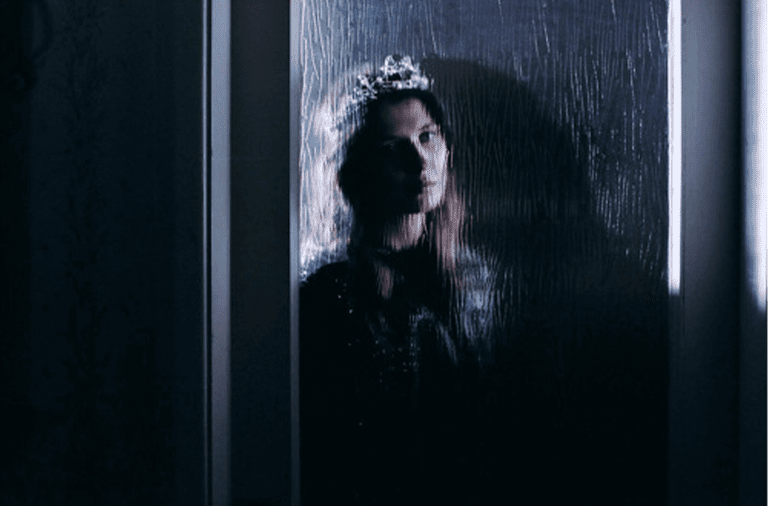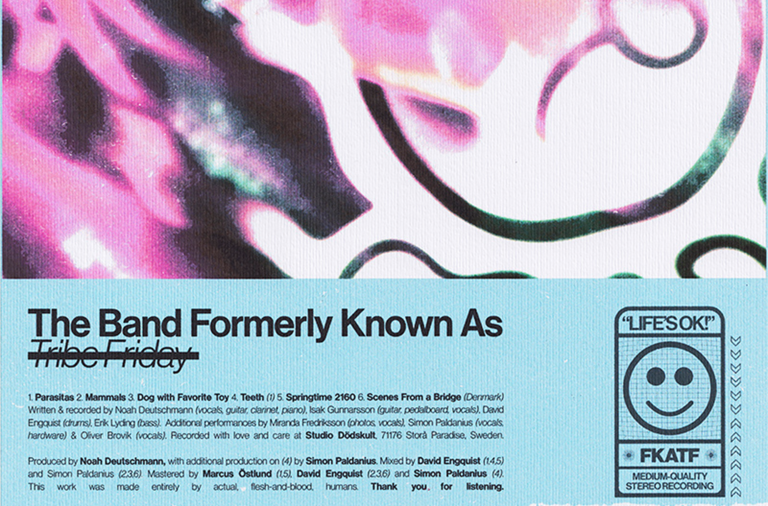Just last year, Swedish indie-rock band Tribe Friday released their debut album Bubblegum Emo. Now, the four-piece is back with their sophomore album Hemma. The band consists of lead singer and guitarist Noah Deutschmann, guitarist Isak Gunnarsson, bassist Robin Hanberger, and the more recent addition of drummer Zack Liljeberg. They describe their music as ‘bubblegum emo’ (as was also the title of the aforementioned debut) and a mix between indie-rock reminiscent of the early 2000s, and gen Z party vibes. How much ‘party’ there actually is on Hemma can be debated, however, because while this album is a collection of mostly upbeat rock tracks, the lyrics speak to the opposite of happiness – let’s dive right into it.

The album begins with title track ‘Hemma’, a song that starts off with a rather soft and almost dreamy sound, yet immediately dives into those opposite-of-happy lyrics. Deutschmann first sings that they are “x-teen holding up a pose” and later “twenty-something, (…) still trying to patch the holes”. In its essence, it’s a song about growing up and growing older. About a third into the song, powerful guitars kick in and the song transitions from melancholic sadness to anger, with screaming vocals being added right before the instrumental breakdown. This makes for a very raw and emotional build-up throughout, immediately setting the tone for the rest of the album.
Next up are two of the earlier released singles, ‘Day One’ and ‘Me and All My Friends’. While both catchy and upbeat tracks, their meaning and tone are vastly different. ‘Day One’ is a comfortable rock song that speaks about a person the singer has not seen in a while, perhaps a parent or old friend, that they try to catch up with, but it just doesn’t work. It is open to the listener’s interpretation who the song specifically is about, but it makes sense to be about someone from back home – like a father one has lost contact with over the years. There is hope that this person has changed, but they have not – as is evident from the lyric “you froze to the state I left you in”. ‘Me and All My Friends’, on the other hand, is a song about a more positive relationship – the one between the lead singer and his friends from his hometown. It is a danceable track about companionship, made especially fun by the kazoo instrumental break. The track is accompanied by the cutest music video of all the band members – very heartwarming.
‘Andy’ is another song about friendship, specifically with the person the song is named after. It seems to be a slightly-more-than-friends situation, with Deutschmann singing about the “lipstick hanging out with your teeth”. The singer makes it clear that they still care about Andy, even though they may have lost contact. It is a rock track with great guitar riffs and softer vocalization, where the heavier instrumentals kick in later on in the song. This makes for an especially interesting transition towards the album’s first instrumental interlude ‘Dag Sju’: a soft, instrumental track that serves as a breather between all the intense rock. It is very comforting to listen to and feels almost like a warm hug right before we drive right back into the heaviness. It speaks to the band’s talent that they are able to emulate these feelings of comfort without even any lyrics at all.
The sixth track, ‘Swimsuit’, was the album’s first single to come out back in March, and while it worked perfectly as a standalone, it also grows greatly onwards from ‘Dag Sju’ thanks to another amazing transition. In the song, a girl named Mathilda gets a new swimsuit, making all the boys suddenly go crazy for her. One of these boys ends up dating her, but unfortunately also becomes the reason for her untimely demise as he gives her access to drugs that seem to eventually come to kill her – “she’d still be here if you’d let her” Deutschmann sings. While the song has quite an upbeat and even fun sound, the lyrics are anything but.
Next up is ‘As Good As It Gets’, the longest track on the album that begins with an acoustic guitar and soft vocals. It speaks of a relationship between the singer and a boy and discusses the singer’s poor mental health in its first verse by stating that “he’d be gone in about a second if he knew about the things I’m thinking inside my head”. Dating the boy in question seems to be an immediate result of this, as he is most definitely not a good person who will just cause cracks and make a mess. This is written off as okay, because it’s believed that “he’s as good as it gets” and that it’s at least better than “suffer[ing] it alone”. Halfway through the track, the drums kick in and there is a major change in tone once again from sadness to anger. The track ends with an outro in Swedish, which roughly translates to “it will happen again” – it seems as they have not learned from this mistake. This song definitely stands out as one of, if not the, best on the album with raw, painfully relatable lyrics.
In line with ‘Swimsuit’, the theme of drugs and/or alcohol abuse returns in ‘Comedown’. The song starts off with the sounds of paper being rustled – possibly the ones mentioned in the lyrics “head’s blank post hundred pages, I’ll pen a hundred more”. In the chorus, Deutschmann sings about fixing themselves another round and about self-inflicted wounds. It is a typical emo track about self-harm and self-medication captured in the band’s unique sound. The song also makes a nod back to the idea of Hemma, with the singer stating he had to come back home to remind himself he is just like his friends.
‘Salt Clouds’, another one of the singles, gives a song about the relationship with a parent. Specifically, it seems to be about trying to get over and forgive a person – here interpreted as the parent – for how they have made you feel, but not being able to discuss this with them. The singer speaks of hoping that leaving and getting out would help, but that they are not able to shake off what has happened. “I just want to talk” Deutschmann sings in the first verse; but it is made clear in the second one that this is harder than he’d hoped. It is a very personal and emotional track accompanied by the band’s signature heavy guitar sounds kicking in in the chorus.
Next up is the combination of the instrumental ‘Big Pond’ and the song ‘Little Fish’, which has some of the most interesting lyrics on the album. Obviously, ‘Little Fish’ is about so much more than a fish. The ‘fish’ attempts to climb a mountain, and while the fish could in doing so grow to be ten feet tall, they could also grow to be “nothing at all”. The song thus speaks about possibilities, but ultimately also about failure. The ‘fish’ believes that their pond days have taught them nothing, but eventually learns to realize that this pond has also changed without them, making it impossible for the doomed fish to return. The track therefore teaches a lesson on the importance of not forgetting where you have come from and never pretending that you are above them. While upon first listen a nice breather from all the dark lyrics, it is actually quite a deep song when one looks below the surface (of the pond). It is a really fun track that is not ‘just a silly fish song’.
As the end of the album is near, it is interesting to note that these last few tracks start to make nods back towards earlier ones, with ‘Okay Sometimes’ mentioning the same Andy from the song that carried his name as the title. Andy has a thing for the singer – yet is still “straighter than a gun” – with Deutschmann stating that “it can be okay sometimes” and saying he thinks he’s “falling in love now”. It is a more lighthearted track and almost a cute little love song, as Andy does really care for them. It wouldn’t be a Tribe Friday track without some self-deprecation – Deutschmann sings that “it’s one of those days where I’m almost enough” – but it is by far more gentle than the rest of the album has been. The song closes with a fun little sax solo.
The second-to-last track is ‘201’, which continues the brass instruments theme and adds a drum solo around the two minute mark. These drums get louder and faster towards the end of the song, with Deutschmann screaming the lyrics, before they cut right off and make the song end on a soft note. The second verse of this song is entirely in Swedish and seems to speak more on the relationship between singer and their place of origin, their hemma. He sings that home is only supposed to be a name of something that can be blamed for anything, yet despite everything, it will always remain exactly that: home. It is quite open to interpretation, but the incorporation of the Swedish verse makes it fit in perfectly with the album’s overarching themes.
The final track, ‘Years’, ties up the album perfectly for several reasons. First off, this song too has a Swedish verse about hemma. Deutschmann sings in the song that they have been gone from home for years and that he has been “growing up and getting better” and has so “really proved you wrong”. They have left home, have gotten over missing it and have realized that ‘home’ is just as scared as they are – because that is how home made them to be. Secondly, ‘Years’ also makes several nods back to ‘Day One’ in its lyrics by mentioning at the start that it is now “day twenty” and later also mentioning that while “it’s [not] perfect, (…) I’m patching all my holes” – the same that were mentioned early on in the album. With this final song, it feels like the journey has come and gone. Throughout it, the kid has grown up and returned to their roots, having become more mature and forgiving throughout the process.
Hemma is a collection of fourteen tracks that talk about themes such as self deprecation, identity, drugs, love, death – and most importantly, a sense of belonging. The album consists mainly of upbeat songs with much darker lyrics than their sounds would make one expect. It is relatable to all ‘emo kids’ – as the band members describe themselves to be – and is surprisingly clever in its thematization and lyrical content. All in all, Hemma is exactly about the translation of its title – growing up, family ties, and looking back to where you’ve come from and at how far you’ve come since. It is more serious and mature than the band’s debut album both instrumentally and lyrically and it is certain that the band will only keep getting better from here on out.
Written by: Mandy Huibregtsen
Edited by: Molly Day



